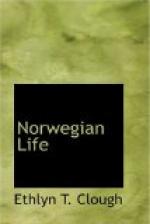All the professions and occupations common to men are open to the women of Sweden, and in 1862 suffrage was granted women in municipal affairs. They are permitted to vote at the election of delegates to conventions which choose members of the first chamber of parliament. These rights can now be exercised by all women who pay taxes. In Stockholm, however, a woman voter must be out of debt and the lawful owner of the property upon which the taxes are paid.
The members of the first chamber of the parliament, which corresponds to the United States Senate, are elected by conventions of delegates chosen at popular elections in the country and in cities by the members of the municipal councils. Therefore, as women have the right to vote for members of the municipal council and for delegates to these conventions, they participate indirectly in the election of the Swedish Senate; but comparatively few exercise the privilege.
Women of advanced views, aided by the members of the socialist party, are now seeking universal suffrage and a law making them eligible to parliament and to membership in the provincial and municipal councils. This proposition has not met with much favor, and the only time it has ever been brought to vote it was unanimously defeated in the first chamber of parliament and in the second by fifty-three nays to forty-four yeas, less than one-half the members present voting.
The first woman to practice medicine in Sweden was Caroline Widerstrom, who is still living and occupies a prominent position in Stockholm. Her practice is as large and as profitable as that enjoyed by most of the men physicians.
The foremost woman in Sweden to-day in intellect and influence, in popular esteem and in public movements, and the recognized successor of Fredrika Bremer, is Ellen Key, an authoress and editorial writer upon Svenska Dagbladet.
In the system of local government in Norway, women now participate upon an equal basis with men. The movements which culminated May, 1901, had been going on since 1884 under the leadership of Miss Gina Krog, who may be called the Susan B. Anthony of Norway. In the latter year she organized a woman’s suffrage association, delivered a series of lectures on the subject, and established a newspaper called the Nyloende—meaning “the new ground.” Miss Krog is something over fifty years of age, of fine education and excellent family, and has been noted for her activity in literary and charitable affairs. She has been a teacher, a writer for the press, a director of charitable institutions, and has lived a life of great activity and usefulness, devoting her own means with generosity to the cause which she has undertaken.




